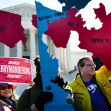Wisconsin Attorney General Joshua Kaul and Governor Tony Evers are petitioning the state supreme court to assume original action in a case against the state legislature. The suit not only involves all three branches of government but pits two of them against each other. Kaul and Evers seek to have a law struck down that they maintain is unconstitutional. Their petition alleges that Act 369 violates the separation of powers by allowing the legislature to usurp roles that properly belong to the executive.
The case goes back to a lame-duck session of the largely Republican legislature at the very end of 2017. In preparation for the inauguration of a Democratic governor and attorney general, Wisconsin lawmakers passed a pair of controversial acts that sought to limit the powers of the governor and the Department of Justice. These laws have indeed proven a thorn in the side of Kaul and Evers, and they have been challenged in court on several occasions, most recently in a case that reached the state supreme court this July. That case appealed an injunction that had been granted against many of the lame-duck laws; a 4-3 Republican court granted the appeal.
Despite the length of the court’s decision (it runs to144 pages), Justice Brian Hagedorn wrote that “because the Legislative Defendants failed to set forth sufficient arguments on several challenged provisions, these claims may proceed in the ordinary course of litigation on remand. We express no opinion on the merits of those claims.”
That opinion left a door wide open to further litigation, such as the petition filed by Kaul and Evers on November 23. In it, the Attorney General and Governor seek a preliminary injunction and the overturning of the lame-duck law that places the legislature’s joint committee on finance in charge of settlements of all plaintiff-side litigation brought by the state. To quote the memorandum filed with the court:
any civil action prosecuted by the department…on the initiative of the attorney general, or at the request of any individual may be compromised or discontinued…by submission of a proposed plan to the joint committee on finance for the approval of the committee. The compromise or discontinuance may occur only if the joint committee on finance approves the proposed plan.
In other words, the job of settling actions filed by the Department of Justice now rests, not with the Democratic Attorney General, but with the heavily Republican joint committee on finance. The suit maintains that the statute, as applied to two specific areas of litigation not covered by the July case, is unconstitutional because it violates the separation of powers upon which Wisconsin’s Constitution is built.
The first of the two areas is environmental or consumer protection actions. The second is:
claims on behalf of executive state agencies relating to the administration of programs they are statutorily charged to execute… such as contractual disputes with vendors or tort claims against individuals who have damaged state property managed by the agency.
Thus, if someone has a car accident and damages a road divider, the case has to go to the legislature’s committee if an out-of-court settlement is to be reached.
That means that the joint committee on finance has to meet in order for the Department of Justice to settle any case, and the committee does not appear to sit with any great frequency. Thus litigation that would benefit from a speedy and efficient resolution is now subjected to a complex process of ratification that even requires public hearings. The suit maintains that the operation of the joint finance committee is virtually antithetical to the proper resolution of the two types of cases the petitioners’ memorandum discusses.
The case rests upon a separation of powers argument: “May the legislative branch grant itself authority over the executive function of resolving plaintiff-side civil litigation involving state entities?”
The legislative branch exists to make laws. The executive exists to execute and enforce them. Therefore: “the legislative branch has finished its job well before civil litigation begins—in the civil enforcement context by enacting statutes to protect the public, and in the executive agency context by enacting the statutes creating agencies and the state programs they execute.”
Therefore the legislature should not return itself to such matters by making itself the arbiter of resolution of the types of litigation covered by the suit. The lame-duck “statute transfers a classic executive function to the legislative branch.” Kaul’s petition is an effort to restore the balance of power in the state of Wisconsin.
Although the petition maintains that it presents a purely legal question, there can be no doubt that party politics enter into the debate. The lame-duck laws were enacted to spite – it’s not too strong a term – an incoming Democratic administration that has been repeatedly stymied, precisely as the laws’ enactors intended. Although more evidence of the polarization of this country’s politics is hardly necessary, the situation with the lame-duck laws in Wisconsin illustrates the extent to which one party will go to irritate the other. We are left to question whether a Republican executive would object as strongly to the statute as the Democrats are objecting, regardless of the fact that a Republican executive’s prerogatives would be impinged upon just as much as those of Kaul and Evers.
Perhaps the question boils down to this: does the lame-duck law pit the executive against the legislature, or Democrats against Republicans?






